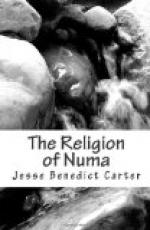Now that we have seen what Augustus did, the question arises irresistibly as to the measure of his success. There can be no question but that he was successful in obtaining the immediate object which he was seeking after. A formal religious life was unquestionably brought into being, and such strength as that life had was exerted in behalf of the empire. This is only in part true of the city but it is absolutely true of the provinces, where after all in the long run the balance of power was bound to lie. In every case the religious reform, begun in the city, spread rapidly through the rest of Italy and out into the provinces. There the negative elements, which hindered its growth in Rome itself, were absent. For the provinces the empire was all gain, and even a bad emperor was far better than none at all.
The politics of Augustus had recreated the religion which the politics of the last century of the republic had destroyed, had recreated it in as far as political considerations could. But the spirit of scepticism which had made possible the political abuse of religion could not be driven out by any further application of politics. A form might be created, both the paraphernalia of temples and the hierarchy of priests whose business it was to perform certain cult acts, but there the power of enactment ceased. In the main the religious life of the people went on for good or for ill entirely independent of these things. All that was alive and real in the simple domestic cult went on down into the empire, and those who were faithful were faithful still. The cults of the Orient, against which Augustus had done all that he dared, still captured the minds of the vast majority of the people, and a Mithras or an Isis meant infinitely more than a Mars or a Vesta, even if Mars were the avenger of a Caesar, and Vesta the goddess of the living emperor’s own hearth. Among the more intellectual classes the folly of the one set of gods, the darlings




